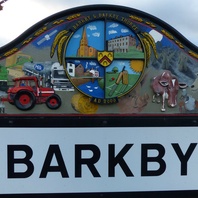
Viking Names
Barkby
Barkby, in the East Goscote Hundred of Leicestershire, is a Scandinavian compound from the Old Norse male personal name Bark, from either Barki (genitive singular Barka), or Barkr, Bǫrkr (genitive singular Barkar) combined with Old Norse by ‘a farmstead, a village’. A late form of the name, Mikeberkby, is prefixed by the Old Norse element mikill ‘great’ to distinguish it from its neighbouring daughter settlement Barkby Thorpe.
Read More
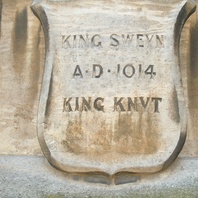
Viking Names
Svein
The Old Norse male name Sveinn was one of the commonest in Scandinavia, particularly in Denmark and Sweden, where it is recorded in many runic inscriptions. It occurs as the first element in the Lincolnshire place-name of Swinethorpe. Early forms of this name confirm that it is nothing to do with swine, but rather contains this name. The name continued in use in both Lincolnshire and Yorkshire well into the thirteenth century. It was famously the name of the father of King Knútr, later king of all England. Sveinn was known as ‘Forkbeard’ and died in Gainsborough, Lincolnshire, in 1014 according to the Anglo-Saxon Chronicle.
Read More
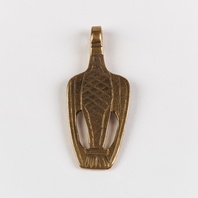
Viking Objects
Reproduction Bird Pendant
A reproduction bird pendant based on one found at Langford, Nottinghamshire. The nearest parallel to this type of brooch is one from Yaroslavl in Russia. The bird symbol, very similar to the one depicted on this pendant, was used by the Rurik dynasty which had started the conquest of Slavic lands in the mid 9th century and later formed the polity of Rus’. With some exceptions, pendants were generally worn by women as an accessory to Scandinavian dress.
Read More
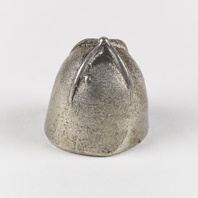
Viking Objects
Reproduction Lead Gaming Pieces
Reproduction lead gaming pieces of a type commonly found across the East Midlands, including at the Torksey Viking camp. The reproductions are tin alloy while the originals were made of lead. These gaming pieces would have been used to play hnefatafl or Nine Men’s Morris, both of which are games known to have been played by Scandinavians throughout the Viking diaspora. It has also been suggested that these might have been weights.
Read More
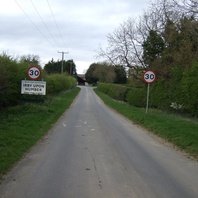
Viking Names
Irby upon Humber
Irby upon Humber, in the Bradley Wapentake of Lincolnshire, comes from Old Norse Íra,the genitive plural form of Íri ‘an Irishman; probably also a Norseman who had lived in Ireland’ and Old Norse by ‘a farmstead, a village’. The reference is probably to an isolated settlement of Norwegian vikings from Ireland, or perhaps Irishmen who came with the vikings to England. However, the exact implications of such a name are not yet fully understood and are the subject of ongoing work by Dr Jayne Carroll of the Institute for Name-Studies, University of Nottingham. Irby upon Humber is to distinguish the place from Irby in the Marsh, also in Lincolnshire.
Read More
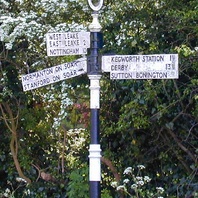
Viking Names
West Leake
West Leake, in Rushcliffe Wapentake of Nottinghamshire, is a simplex name from Old Norse lœkr ‘brook’. East and West Leake are on the banks of a small stream which joins the Soar at Kingston.
Read More
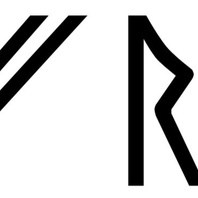
Viking Names
Ingifrid
Ingifríðr appears fairly frequently in Denmark and Sweden. The name is attested twice in England during the Middle Ages in the forms Ingefrit and Ingefrid in documents from Lincolnshire and Yorkshire respectively. It is an Old Norse compound name with its first element Ingi-, which is of doubtful origin but might relate to a Greek word meaning ‘lance’ or ‘staff’ combined with and the second element -fríðr, related to Gothic frījōn ‘to love’, with original meaning ‘loved’, later ‘fair’. In origin it is thus the same name as Ingiríðr.
Read More

Viking Names
Miningsby
Miningsby, in the Bolingbroke Wapentake of Lincolnshire, is a very difficult name with a great variety of spellings. The best suggestion for the first element is the Old Norse male personal name Miðjungr, but this name is only known as that of a mythical giant, recorded in an early skaldic poem cited in Snorri Sturluson’s Edda, or as an appellative for ‘giant’ in skaldic poetry more generally. The second element is Old Norse by ‘a farmstead, a village’.
Read More
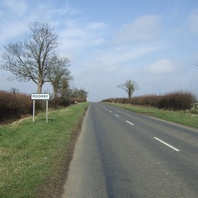
Viking Names
Moorby
The first element of Moorby, in the Horncastle Wapentake of Lincolnshire, is either Old English mor or Old Norse mór ‘a marsh; barren upland’ here in the sense ‘moor’. The second element is Old Norse bý ‘a farmstead, a village’. The village is on the slope of the Wolds.
Read More

Viking Names
Fotherby
Fotherby, in the Ludborough Wapentake of Lincolnshire, comes from the Old Norse male personal name Fótr and the Old Norse element bý ‘a farmstead, village’. The same personal name occurs in other place-names in Lincolnshire including Foston and Fosdyke. There is also a Foston in Derbyshire.
Read More

Viking Names
Asgerda
Ásgerða is a predominantly West Scandinavian (Norway and Iceland) name and is a weak form of the more common Ásgerðr, which is also found in Swedish runic inscriptions. Asgarthcroft, a field name recorded in 1523 in Aberford, West Yorkshire, had Ásgerða or Ásgerðr as its first element. Both elements are common in Old Norse name-formation, the first meaning Ás- ‘a god’ and the second being the feminine equivalent of masculine -garðr, probably meaning something like ‘protection’.
